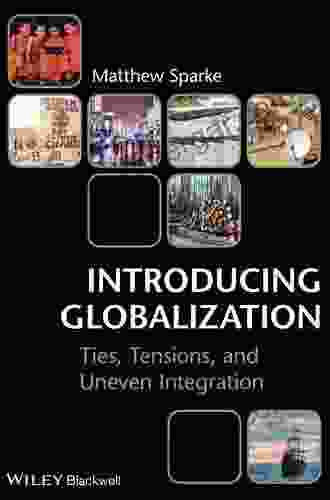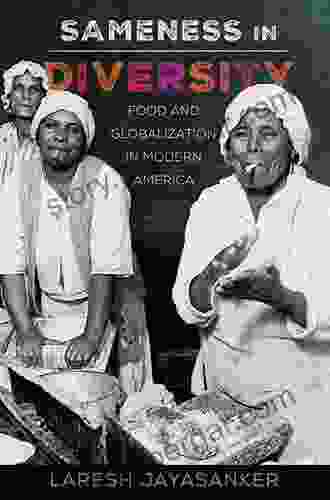Introducing Globalization: Ties, Tensions, and Uneven Integration

Globalization is a complex and multifaceted phenomenon that has been shaping the world for centuries. It has brought people, ideas, and goods from all over the world closer together, leading to unprecedented levels of interconnectedness and interdependence. However, globalization has also led to increased inequality, environmental degradation, and social unrest. In this book, we explore the history, causes, and consequences of globalization, and we consider the challenges and opportunities it presents for the future.
The History of Globalization
The roots of globalization can be traced back to the earliest days of human history. Humans have always traded with each other, and over time, these trade networks have grown increasingly complex and far-reaching. In the 15th century, the European Age of Exploration marked a new era of globalization, as European explorers established contact with the Americas, Asia, and Africa. This contact led to the exchange of goods, ideas, and diseases, and it had a profound impact on the development of both the East and the West.
The Industrial Revolution in the 18th and 19th centuries further accelerated the process of globalization. New technologies, such as the steam engine and the telegraph, made it possible to transport goods and people more quickly and easily than ever before. This led to a dramatic increase in global trade and investment, and it also led to the rise of multinational corporations.
In the 20th century, globalization took on a new dimension with the advent of the Internet. The Internet has made it possible to communicate and share information instantly with people all over the world. This has led to a new era of global interconnectedness, and it has also raised new challenges, such as the spread of misinformation and cybercrime.
The Causes of Globalization
There are a number of factors that have contributed to the rise of globalization. These include:
- Technological advances: The development of new technologies, such as the steamship, the airplane, and the Internet, has made it possible to transport goods and people more quickly and easily than ever before.
- Economic liberalization: The adoption of free trade policies by many countries has reduced barriers to trade and investment, and this has led to a boom in global economic activity.
- Political liberalization: The end of the Cold War and the collapse of the Soviet Union have led to the spread of democracy and free markets, which has further reduced barriers to global trade and investment.
The Consequences of Globalization
Globalization has had a profound impact on the world, both positive and negative. Some of the positive consequences of globalization include:
- Increased economic growth: Globalization has led to increased trade and investment, which has boosted economic growth in many countries.
- Reduced poverty: Globalization has helped to lift millions of people out of poverty, particularly in developing countries.
- Improved living standards: Globalization has led to increased access to goods and services, which has improved living standards for people all over the world.
However, globalization has also led to a number of negative consequences, including:
- Increased inequality: Globalization has led to increased inequality between rich and poor countries, and between rich and poor people within countries.
- Environmental degradation: Globalization has led to increased consumption of resources and increased pollution, which has damaged the environment.
- Social unrest: Globalization has led to increased cultural homogenization, which has led to social unrest in some countries.
The Challenges and Opportunities of Globalization
Globalization is a complex and multifaceted phenomenon that presents both challenges and opportunities for the future. The challenges of globalization include:
- Managing the negative consequences of globalization: Globalization has led to a number of negative consequences, such as increased inequality, environmental degradation, and social unrest. These challenges need to be managed in Free Download to ensure that globalization benefits all people.
- Promoting a more equitable globalization: Globalization has led to increased inequality between rich and poor countries, and between rich and poor people within countries. This inequality needs to be addressed in Free Download to ensure that globalization benefits all people.
- Protecting the environment: Globalization has led to increased consumption of resources and increased pollution, which has damaged the environment. This damage needs to be reversed in Free Download to protect the environment for future generations.
The opportunities of globalization include:
- Increasing economic growth: Globalization can lead to increased trade and investment, which can boost economic growth in all countries.
- Reducing poverty: Globalization can help to lift millions of people out of poverty, particularly in developing countries.
- Improving living standards: Globalization can lead to increased access to goods and services, which can improve living standards for people all over the world.
Globalization is a complex and multifaceted phenomenon that presents both challenges and opportunities for the future. By understanding the history, causes, and consequences of globalization, we can better manage the challenges and seize the opportunities that it presents.
Globalization is a powerful force that is shaping the world in profound ways. It has the potential to bring people, ideas, and goods from all over the world closer together, leading to unprecedented levels of interconnectedness and interdependence. However, globalization also has the potential to lead to increased inequality, environmental degradation, and social unrest. In Free Download to ensure that globalization benefits all people, we need to manage its negative consequences and promote a more equitable globalization.
Do you want to contribute by writing guest posts on this blog?
Please contact us and send us a resume of previous articles that you have written.
 Book
Book Novel
Novel Page
Page Chapter
Chapter Text
Text Story
Story Genre
Genre Reader
Reader Library
Library Paperback
Paperback E-book
E-book Magazine
Magazine Newspaper
Newspaper Paragraph
Paragraph Sentence
Sentence Bookmark
Bookmark Shelf
Shelf Glossary
Glossary Bibliography
Bibliography Foreword
Foreword Preface
Preface Synopsis
Synopsis Annotation
Annotation Footnote
Footnote Manuscript
Manuscript Scroll
Scroll Codex
Codex Tome
Tome Bestseller
Bestseller Classics
Classics Library card
Library card Narrative
Narrative Biography
Biography Autobiography
Autobiography Memoir
Memoir Reference
Reference Encyclopedia
Encyclopedia Mitsuyo Saito
Mitsuyo Saito Missy Wolfe
Missy Wolfe Seung Sahn
Seung Sahn Marnie Hughes Warrington
Marnie Hughes Warrington Ricky D Phillips
Ricky D Phillips Sun Young Rieh
Sun Young Rieh Mario Taylor
Mario Taylor Martin Esslin
Martin Esslin Rashid Khalidi
Rashid Khalidi Milan Venter
Milan Venter Terri Clark
Terri Clark Matt Lashley
Matt Lashley Muhammad Zulqarnain
Muhammad Zulqarnain Russell Jackson
Russell Jackson Martin Mcgartland
Martin Mcgartland W E Vine
W E Vine Mark A Pereira
Mark A Pereira Marlin U Thomas
Marlin U Thomas Paul Bowles
Paul Bowles Theresa Dodaro
Theresa Dodaro
Light bulbAdvertise smarter! Our strategic ad space ensures maximum exposure. Reserve your spot today!
 Junichiro TanizakiFollow ·9k
Junichiro TanizakiFollow ·9k Raymond ChandlerFollow ·16k
Raymond ChandlerFollow ·16k Joel MitchellFollow ·16.8k
Joel MitchellFollow ·16.8k Robin PowellFollow ·3k
Robin PowellFollow ·3k Jules VerneFollow ·10.2k
Jules VerneFollow ·10.2k Patrick RothfussFollow ·18.2k
Patrick RothfussFollow ·18.2k Jerome PowellFollow ·2.9k
Jerome PowellFollow ·2.9k Charles BukowskiFollow ·19.4k
Charles BukowskiFollow ·19.4k

 Roberto Bolaño
Roberto BolañoUnveiling the Beauty and History of the Medici Iris: A...
In the realm of...

 Theodore Mitchell
Theodore MitchellImproving Gut Health in Poultry: Unlocking the Path to...
In the ever-evolving field of...

 Victor Hugo
Victor HugoPersonalized Medicine with a Nanochemistry Twist:...
The future of healthcare...

 George Martin
George MartinA Year Of Wine: Perfect Pairings Great Buys And What To...
## Year of Wine: An Epic Journey Through the...

 Tom Hayes
Tom HayesDelve into the Enigmatic World of Southern Africa's...
Embark on a captivating journey through the...














